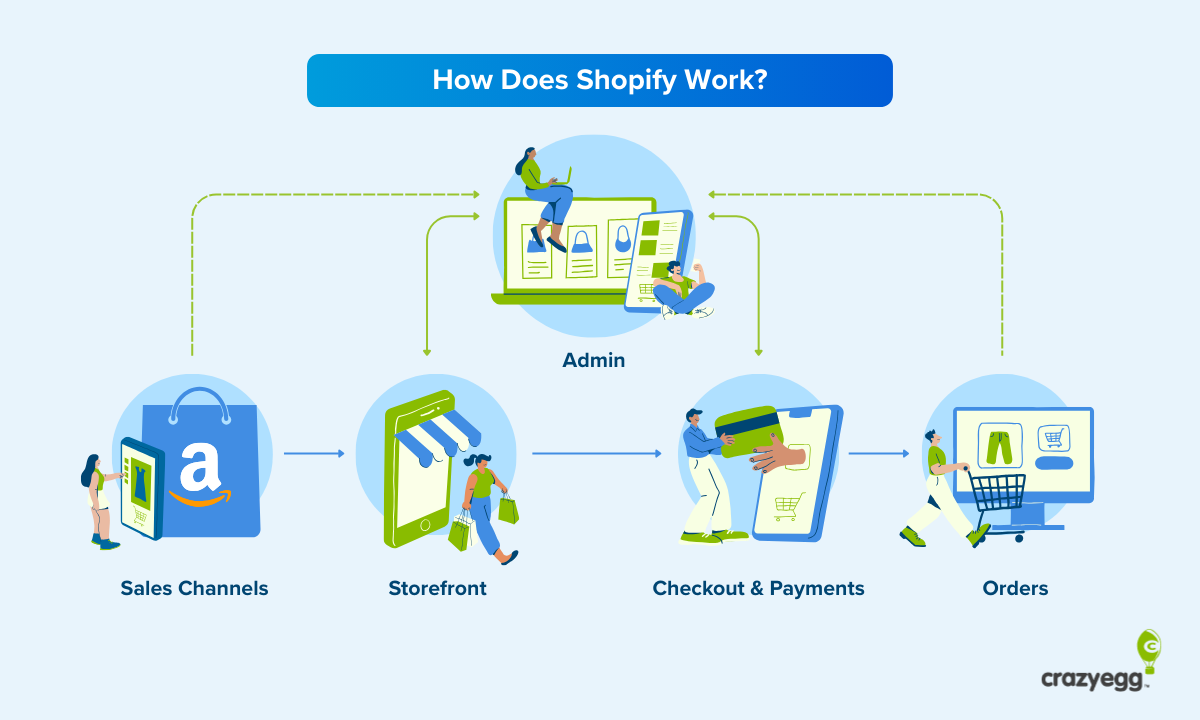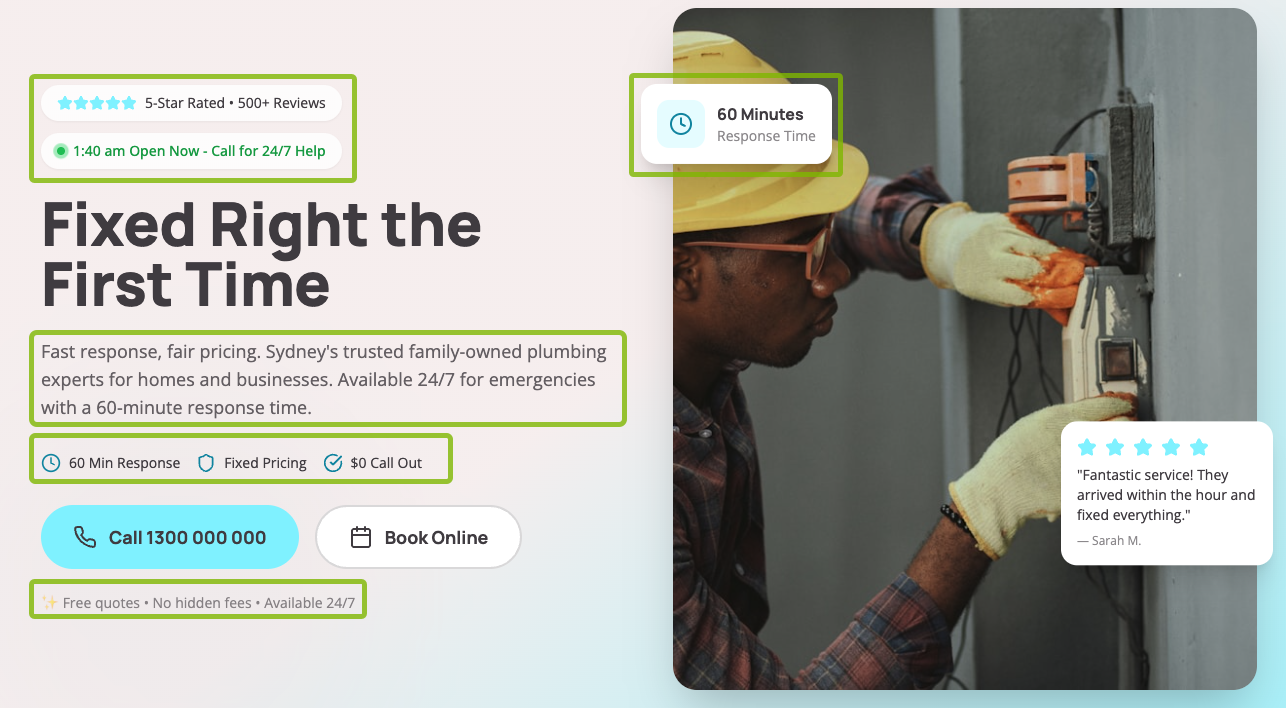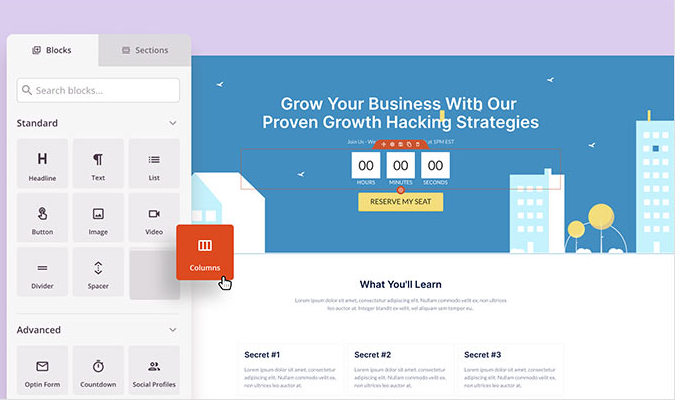At a minimum, every website needs two things—a domain name and web hosting. These are both required to have a live site with real visitors.
It’s common for beginners to have some misconceptions about these two components of running a website. The terms are often confused with each other and incorrectly used interchangeably.
If you’re new to the world of running a website, this guide will steer you in the right direction. You’ll learn the differences between a domain name and a web hosting service, as well as crucial insights on obtaining each. This guide will ultimately act as the foundation for getting started with a new website.
Difference Between Domain Name and Web Hosting
A domain name is the URL address that internet users type into their browser or click on to land on a website.
Domain names contain two parts—the site name and extension. Our website name is Crazy Egg, and our extension is .com. When you put these together, you get our complete domain, crazyegg.com.
Behind every domain is an IP address. This is a unique string of numbers that identify your site from others on the web. While it’s easy for a computer to memorize these numbers, the average human will have some problems with this. For practical purposes, domain names are much easier to remember than a numeric address. So domains act as a shortcut to each site’s IP.
Every website contains several folders, files, and unique data. All of that information must be stored on a server for people to access the information on your website. That’s where web hosting comes into the equation.
Web hosting providers maintain the website data required to power your site. So when a person enters your domain into their web browser, your hosting server sends the necessary files back to the user’s device so they can view your website and its contents.
Think of a domain like the address of a house and web hosting as the actual house.
While domains and web hosting are very different, the two are still connected in the sense that your site can’t operate without either. Nobody could find your website without a domain name, and without hosting, you wouldn’t have a place to store your website’s files.
Quick Tips to Improve Domain Name Registration and Web Hosting Today
While domain registration and web hosting might seem complicated, it’s actually really easy to get both if you follow the right procedures. The following tips will allow anyone to get started with a domain and web hosting right away regardless of experience.
Tip #1 — Get a Domain Name and Web Hosting Separately (with Exception)
As previously stated, domain names and web hosting are two very different things. So most of the time, they should be purchased from separate providers. You should get a domain name from a domain registrar and hosting from a web hosting service.
It’s worth noting that there are some circumstances where it makes sense to bundle these services (we’ll cover that in the next tip). But for now, we’ll dive into getting these separately.
Let’s go back to the house analogy. Every house needs to have plumbing and electrical. These two very different services are offered by different tradesmen. You wouldn’t hire a plumber to do your electrical, and you wouldn’t hire an electrician to fix your pipes. The same concept can be applied to websites.
Domain registrars are ideal for registering domain names. But their hosting services are usually subpar.
Web hosting providers specialize in hosting but aren’t always ideal for getting a domain. If you get your domain from a hosting provider, they’re likely just contracting that service from a domain registrar. So the price for this will usually be a bit higher, so the hosting service can profit as well. It will also be harder to transfer your domain down the road.
We recommend getting your domain name from Domain.com.

For more than 20 years, Domain.com has been providing domain names to sites worldwide. In fact, domain names purchased from Domain.com power over 1.2 million sites on the web.
Getting a domain here is fast, easy, and affordable. With .com domains starting at just $11.99, it’s tough to find a better deal from such a reputable domain registrar. Another top benefit of Domain.com is the ability to register your domain for up to five years. So you won’t have to worry about renewing it annually. They also offer domain privacy and protection starting at $8.99 per year.
Once you’ve registered your domain, it’s time to get web hosting. Hostinger is our top recommendation for most people in this category.
Hostinger is web hosting built for beginners. They offer hosting solutions as low as $2.99 per month, which is an incredible deal from the performance you’ll get in return. All plans come with a free SSL certificate, free CDN, 24/7 support, and a 30-day money-back guarantee.
If you’re launching your first site and want to keep hosting costs as low as possible without sacrificing performance, Hostinger should be at the top of your list.
Check out our complete guide on the best web hosting services and our list of the best domain registrars for alternative solutions in each category.
Tip #2 — Bundle Your Domain and Hosting Service Together
Obviously, this directly contradicts the tip above. But here’s that exception that we alluded to earlier.
If you’re just starting a single website and don’t need to register multiple domains, you can bundle your domain name and hosting service into a single package. However, you can’t just do this anywhere. Never get your hosting service from a domain registrar, and avoid getting a domain name from most hosting services.
Beginners that want to get everything under one roof should use Hostinger for domain registration and web hosting.

Hostinger is a web hosting provider that powers more than two million websites across the globe. They offer shared hosting, cloud hosting, VPS hosting, WordPress hosting, and even managed WordPress hosting—there’s a solution for everyone.
In addition to being an industry leader in support and performance, Hostinger offers a free domain name with every new hosting plan.
Cost aside, the ability to register your domain from your hosting provider makes the process so much easier. You won’t have to go through the extra hassle of making purchases through different platforms, and you won’t have to connect your domain to the host later. All of this can be managed by a single service provider during the same checkout process.
Within minutes, you can have a domain name, hosting service, and a new website up and running with Hostinger.
If you plan to purchase and manage multiple domains or want to register domains with really unique extensions, this option won’t be ideal for your situation. But for beginners starting a new site from scratch looking for the path of least resistance, bundle your domain name and web hosting with Hostinger.
Tip #3 — Opt For Long Contracts
For domain registration and web hosting alike, it’s usually in your best interest to lock in the longest possible contract.
The last thing you want is for your domain name to expire. Once that happens, it will become available for anyone else to purchase and register. So if you have a business or you’re building a brand online, this will obviously be detrimental to your success and growth. In the process of running a website, you have plenty of other things on your plate. You don’t want to worry about renewing your domain every year.
When you’re finalizing the domain purchase from Domain.com, you’ll have the option to register that name for up to five years.

Aside from the convenience, it’s also cheaper to lock in a longer contract. Lots of domain registrars increase the price of your domain after the initial registration. For example, .com domains from Domain.com start at $11.99 but renew at a higher price point.
Web hosting is the same. It’s basically the industry standard in web hosting to offer low introductory rates and then increase the price after the initial contract expires.
Hostinger’s lowest advertised monthly rates are for 48-month contracts. So you’ll lock in the $2.99 per month for four year, and it renews at just $7.99 per month.

If saving money is important to you, then it’s always going to be in your best interest to lock in the longest possible contract for domain registration and web hosting. You’ll have to pay upfront and in-full when you do this, so your cost today might be a bit higher than you anticipated. But it will save you money in the long-run.
Tip #4 — Skip (Most) Add-Ons
Domain registrars and web hosting providers alike are always looking to upsell new customers. It can be a little annoying, but generally, it only adds an extra few seconds to the checkout process.
Lots of beginners start to get worried when they see optional add-ons offered on the screen. Do I really need this? Is my site going to have problems if I don’t add this? These thoughts are likely running through your head.
Don’t stress out here. You can skip the vast majority of these upsells.
For example, before you enter your billing information on Domain.com, you’ll have the option to add G Suite, a website builder, web hosting, SSL certificates, and SiteLock Security to your plan. Skip all of these. Some of these services you can get for free directly from your hosting provider. The others you don’t need right now.
The one thing you absolutely DO need is domain privacy and protection.

This add-on is well worth the cost. If you don’t add this to your plan, all your personal information will be listed on a public database. This includes your name, email address, mailing address, and phone number.
You don’t want spammers to have access to your personal info. All of that will be protected with this add-on.
The best web hosting providers will also offer you a free SSL certificate. In fact, Hostinger offers you unlimited free SSL certificates with its hosting plans. You can also get any additional security packages directly through your web host as well. When in doubt, just skip those during the upsell process too. You could always get site security tools at a later date from a third-party provider. But take advantage of the free SSL from your web host.
Long-Term Strategies For Domain Registration and Web Hosting
Once you’ve registered a domain and set up automatic renewals, there won’t be a ton left for you to do there. But there will always be some long-term strategies that you need to consider for web hosting.
Strategy #1 — Monitor Your Site Performance Metrics
When you’re first getting started, you just need to get your website built and make sure it’s running live on the web. But over time, you want to see exactly how visitors are interacting with your site.
Look at KPIs like uptime and speed. If your site is constantly going down or has slow loading times, it will hinder the long-term success of your site.
The best web hosting providers, like Hostinger, will have built-in resources on your dashboard to monitor these KPIs.
Keep a close eye on these. If something is wrong, you need to determine what exactly is causing the problem.
For example, let’s say your pages are loading slowly. Do you have too many large multimedia files like uncompressed images and videos on that page? Are there too many redirects? Is another website on the same shared server causing your entire site to load slowly?
You can’t fix a problem if you don’t know what’s causing it, and you can’t identify the cause if you’re not constantly monitoring your metrics. Make a habit of doing this on a weekly or monthly basis, at a minimum.
Strategy #2 — Upgrade Your Hosting Plan As Your Traffic Scales
Site traffic is something that you need to monitor as well. Not every website hosting plan can accommodate large volumes of traffic.
Lots of entry-level hosting packages can only support up to 10,000 monthly visits. So if you’re experiencing traffic levels that exceed your plan limitations, it’s time for an upgrade. Ideally, you’ll sort this out before you reach those limits. For example, if your traffic is growing 20% month over month for the past year, you should be able to predict where you’re heading and adapt accordingly.
You’ll eventually outgrow your shared hosting plan, which is a good problem to have. That’s why it’s so important to use a hosting provider that offers room for growth beyond the shared level, like Hostinger.

Upgrade to a VPS (virtual private server) once you start exceeding 25,000 monthly visitors. With one of these packages, your site will have its own dedicated server resources and won’t be impacted by other websites on that same server. So another website with high traffic spikes won’t slow your website down.
Most of you won’t need a dedicated server. But it’s nice to know that Hostinger has them if you ever need something that advanced.
When you’re first starting, it’s fine if your site isn’t operating at the absolute highest level of performance. But as your traffic scales, you’ll need to adjust your plan accordingly.
The only way to do this effectively is by monitoring your traffic, server resources, and performance metrics.






